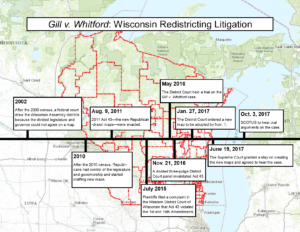This week, Reps. Mark Born (R-Beaver Dam) and John Nygren (R-Marinette) and Sens. Tom Tiffany (R-Hazelhurst) and David Craig (R-Big Bend) circulated litigation reform legislation (LRB 4700) aimed at lowering costs for Wisconsin businesses and government. The bill would modernize Wisconsin’s civil procedures for discovery and class actions to align with corresponding federal rules.
The bill’s reforms address the escalating transactional costs relating to discovery by:
- Making it clear that both courts and parties have an obligation to pursue the just, speedy, and inexpensive resolution of each case.
- Establishing cost-benefit and proportionality requirements for discovery to prevent litigants from abusing the discovery process to leverage a higher potential settlement or engage in a “fishing expedition.”
- Putting on hold discovery and other proceedings pending the court’s decision on a motion to dismiss or other dispositive motions, protecting parties from costly discovery in cases that may be dismissed or where refinement of the pleadings may clarify the allegations and scope of relevant discovery.
- Providing notice of third-party litigation financing, if the financier has a right to receive compensation that is contingent on and sourced from the outcome of the action. Such third party finance can increase the cost of litigation and cause suits to be brought that would not otherwise have been financially justified.
- Limiting discovery of electronically stored information (ESI) to address the escalating volume of ESI that is now one of the most significant discovery-related costs.
- Unless otherwise stipulated or ordered by the court, limiting discovery to 25 interrogatories, 10 depositions, none of which may exceed 7 hours in duration, and a look-back period of not more than 5 years prior to the accrual of the cause of action.
Other reforms related to class action litigation include:
- Aligning Wisconsin’s class action statute with Federal Rule 23. This will provide needed specificity, clarity, and consistency not found under Wisconsin’s current law. Wisconsin’s current one-sentence class action statute is essentially identical to the 1849 Field Code. After 168 years, it’s time for an upgrade. We would be the 48th state to do so.
- Providing a nondiscretionary right to an interlocutory appeal of class certification orders by both plaintiffs and defendants. This is a vital ruling that makes or breaks the case. It should be appealable before other aspects of the case proceed.
- Precluding “no-injury” class actions by requiring the type and scope of injury of the representative parties be typical of the type and scope of injuries of the class.
- Requiring that the class of consumers eligible to make a claim be “ascertainable” by requiring the members of the class be objectively verifiable by reliable and feasible means.
Other reforms in the bill include:
- Regulating lawsuit lending that provides money to consumers with repayment of the money derived from the consumer’s proceeds from the dispute (e.g., a judgment or settlement). There are times when reasonable settlement amounts that would otherwise be agreed upon between plaintiff and defense counsel are rejected because the injured party is “under water” to lawsuit lenders. The regulation of the industry will protect vulnerable Wisconsin consumers from lawsuit lenders that sometimes prey on those injured and unable to work or who may otherwise have substantial medical bills.
- Resetting statute of limitations – the maximum period that one can wait before filing a lawsuit – for certain civil litigation. The revised limits will bring consistency among Wisconsin liability laws and align us better with other states that have significantly lower limits. These lower time limits will promote efficiency and reduce burdens and costs on the state and businesses forced to investigate distant claims.
- Prohibiting the Department of Revenue from entering into a contingent fee agreement with third parties to engage in an audit relating to Wisconsin’s unclaimed property law. State unclaimed property laws, when fairly and appropriately enforced, serve several important functions. But private auditors working under contingency fee arrangements have taken an increasingly aggressive approach to the interpretation and enforcement of unclaimed property laws, which in turn, increases the costs of doing business in Wisconsin.
- Adjusting the interest rate insurers must pay on overdue claims from 12 percent to the prime loan rate plus one percent. In doing so, this rate will mirror interest rates on general judgments and allow the rates to self-adjust consistent with markets.
The bill is supported by Wisconsin Attorney General Brad Schimel, Wisconsin Civil Justice Council, Wisconsin Manufacturers and Commerce, American Tort Reform Association, and the U.S. Chamber of Commerce’s Institute for Legal Reform, among other organizations. Cosponsorship for the bill is due Wednesday, Dec. 6.

